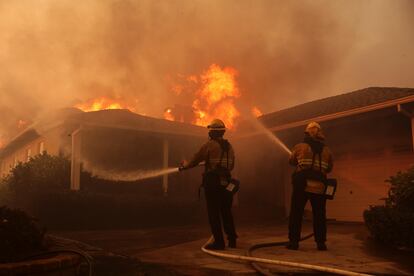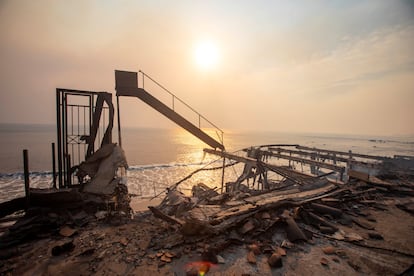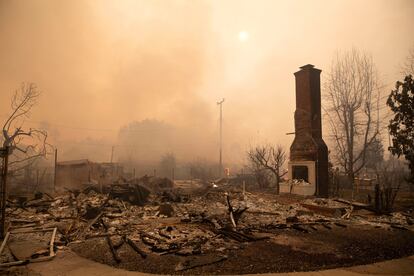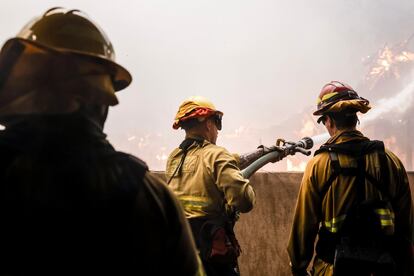Residents of Malibu and Pasadena: ‘It was a hurricane of fire, something completely apocalyptic’
People affected by the two main blazes in Los Angeles County explain how they found out on Wednesday morning whether their houses had been reduced to ashes or spared by the flames

The first rays of sunlight on Wednesday revealed one of the worst tragedies in the history of Los Angeles, caused by several large fires that remain largely uncontained. The devastation caused by the largest of these, the Palisades Fire, was almost complete in Malibu, a coastal community popular with surfers and tourists. Most of the beachfront residences in this region northwest of the city were reduced to ashes overnight by the flames of what is already being described as the most destructive wildfire in Los Angeles history.
It was no time for smiles, but Bill, 64, was wearing one. His concrete house looked like it had been touched by a miracle, still standing alongside three others on a strip of land where everything else was destruction. “No miracle there, I spent the afternoon and part of the night spraying water on the front and side with the hose from my yard,” said the man, who was wearing swimming goggles to keep the ashes out of his eyes.
“It was a hurricane of fire. It was completely apocalyptic,” recalled Bill, who has lived in Malibu since 2011. The media entrepreneur left the area around 10 p.m. on Tuesday, when the mountainside had been burning for 12 hours. But not all the news was good. He has lost what was going to be his other home, in Pacific Palisades, just a few miles away, where he was planning to move in February or March. “That one is gone, it doesn’t exist anymore,” he said. The residence had cost him seven million dollars and he had invested again the same amount to renovate it. “The insurance only covers three million, so my pocket has taken a hit of seven million.” Everyone in his family is safe.

A drive early Wednesday revealed miles of devastation along the Pacific Coast Highway. Of the homes, mostly built of wood, only brick chimneys remained standing. The rest was a mess of scrap metal and burned iron lying by the sea.
Malibu was a ghost town. The only activity Wednesday morning was the coming and going of fire trucks, many of which had arrived from other counties to help with the emergency. The strong winds, with gusts of up to 80 mph — like a Category 1 hurricane — prevented the hundreds of emergency workers from fighting the flames. The power of the storm cut off the stream of water fired from the tanker trucks. It also grounded helicopters and aircraft that are key to fighting the spread of the fire.
The destruction was also felt in Pasadena, east of Los Angeles, where another blaze called the Eaton Fire destroyed between 200 and 500 structures. What at first glance might appear to be just soot-covered walls were only recently homes full of personal stories, schools filled with students, places of worship.

The Francis family home is on Altadena Drive, a tree-lined avenue that separates Pasadena, on the right, from Altadena, on the left. On Wednesday morning, only the charred drum of the washing machine remained standing, as well as what was once a bicycle, now blackened and lying on the ground. Bob Francis, the owner’s son, observed the ruin from the entrance, where the mailbox was surprisingly still standing.
It is the house where Francis’s 82-year-old father lived, where he had accumulated his memories, as well as old documents from his days as a lawyer, now turned into charred papers. Also lost in the flames are the rag dolls that his late wife loved to make. The family was only able to save one.
The house caught fire early Wednesday morning, and they were forced to run away. They got out alive, but their house and a smaller one they rented out in the backyard are no longer there. Francis did not even know if the overwhelmed firefighters came to put out the fire. He found out that the home was gone on television: “I saw the trees on the news and I realized it was our house. Nine years of our life are gone.” His father tried to hide his tears, unable to speak.
A few steps down the same avenue, half a dozen worshippers gathered in front of what used to be the local synagogue. Its president, Jack Singer, seemed reluctant to leave, even though the flames have consumed the three buildings that provide support and faith to 440 families. He said that, like the Temple of Israel, they will rise from their ashes.
About a thousand residents of Pasadena and Altadena sought refuge from a cruel night at the city's Convention Center, which had been set up as a shelter. The outpouring of volunteers and donations was great. Businesses and individuals handed out water, drinks, bagels and other food.
Father Christopher, of the Roman Catholic religious order of the Franciscans, was forced to leave the institute where he works in the early hours of the morning, but decided to bring the van he normally uses to feed the homeless to the center’s door. “We evacuated at 4.30 this morning and, at about eight o’clock, we were here. We brought chicken stews, pasta, salmon, chicken couscous… They are going to bring more for the evening,” he said. He only had water and bags of chips left, but also a lot of hands: “Normally, there are four or five people helping, but now there are more volunteers for this.”

In Pasadena, 37,000 people were forced to evacuate. One of these was Hugo Zavala, a native of Guanajuato (Mexico), who has lived in California for 35 of his 45 years. Smiling at the reception desk of the Pasadena Convention Center, he explained that he lives in Altadena, and got scared when his phone didn’t work in the morning. After having had surgery on his foot due to a traffic accident, he grabbed his backpack and his walking cane and took to the streets for three hours until a vehicle rescued him. “The fire was getting closer and closer. At 6:30 a.m. I received a message that my house no longer exists. It was a house that the government had helped me get, because I had been homeless for seven years and had been living there for four years,” he says, without losing his smile. Was he sure? “Two neighbors have sent me photos and the fire app tells me that 70% of my block is gone.” Now Zavala wants to volunteer and help those who keep coming into the shelter: “Nothing to remind me that I have nowhere to go back to.”
Sign up for our weekly newsletter to get more English-language news coverage from EL PAÍS USA Edition
Tu suscripción se está usando en otro dispositivo
¿Quieres añadir otro usuario a tu suscripción?
Si continúas leyendo en este dispositivo, no se podrá leer en el otro.
FlechaTu suscripción se está usando en otro dispositivo y solo puedes acceder a EL PAÍS desde un dispositivo a la vez.
Si quieres compartir tu cuenta, cambia tu suscripción a la modalidad Premium, así podrás añadir otro usuario. Cada uno accederá con su propia cuenta de email, lo que os permitirá personalizar vuestra experiencia en EL PAÍS.
¿Tienes una suscripción de empresa? Accede aquí para contratar más cuentas.
En el caso de no saber quién está usando tu cuenta, te recomendamos cambiar tu contraseña aquí.
Si decides continuar compartiendo tu cuenta, este mensaje se mostrará en tu dispositivo y en el de la otra persona que está usando tu cuenta de forma indefinida, afectando a tu experiencia de lectura. Puedes consultar aquí los términos y condiciones de la suscripción digital.








































